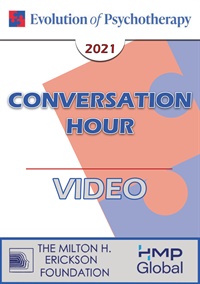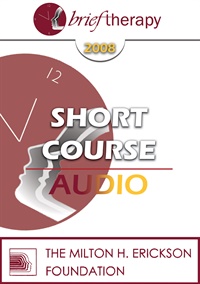
- Average Rating:
- Not yet rated
- Topic Areas:
- Short Courses | Children and Adolescent Therapy | Ericksonian Psychotherapy | Divorce | Psychotherapy | Ericksonian Hypnosis and Therapy Techniques
- Categories:
- Brief Therapy Conference | Brief Therapy Conference 2008
- Faculty:
- Maria Escalante de Smith, MA
- Duration:
- 1:25:05
- Format:
- Audio Only
- Original Program Date:
- Dec 11, 2008
- Short Description:
- Ericksonian psychotherapy emphasizes the utilization of people's resources. When working with children of divorced parents, I focus on strengths and keep in mind the Ericksonian interventions should be brief because children may get tired of being in therapy for a long time. In a case with two children, techniques including the use of toys will be discussed. How to make several brief interventions quickly while utilizing "toy co-therapists" in home assignments, and the combination of conversational trance with tasks will be emphasized. There also will be references to the importance of working with the family system.
- Price:
- $15.00 - Base Price
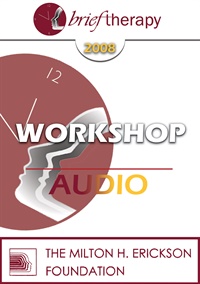
- Average Rating:
- Not yet rated
- Topic Areas:
- Workshops | Brief Therapy | Children and Adolescent Therapy | Divorce | Family Therapy
- Categories:
- Brief Therapy Conference | Brief Therapy Conference 2008
- Faculty:
- Florence Kaslow, PhD, ABPP
- Duration:
- 2:16:47
- Format:
- Audio Only
- Original Program Date:
- Dec 14, 2008
- Short Description:
- What are the differential impacts of divorce on children? This workshop will consider the thoughts, feelings, behavior, issues, concerns and needs of children in different age groups, from birth to 50 years, within the framework of the stages of the divorce process and for years afterwards. Lecture, discussion, clinical examples and role plays will be interspersed as efficacious interventions are considered.
- Price:
- $15.00 - Base Price

- Average Rating:
- Not yet rated
- Topic Areas:
- Workshops | Anxiety | Couples Therapy | Depression | Divorce | Marriage | Relationships
- Categories:
- Couples Conference | Couples Conference 2004
- Faculty:
- Pat Love, EdD
- Duration:
- 1:46:45
- Format:
- Audio Only
- Original Program Date:
- Mar 27, 2004
- Short Description:
- Anxiety and depression are fast becoming the leading causes of personal disability and the single greatest destructive force in relationships. Research indicates that when one person in a relationship is depressed, the divorce rate goes up nine times. Therefore, it is vital that therapists learn to recognize typical and atypical symptoms early in therapy. It also is imperative that symptoms of relational depression are recognized. Lecture, video, written exercises and demonstration will be used.
- Price:
- $15.00 - Base Price
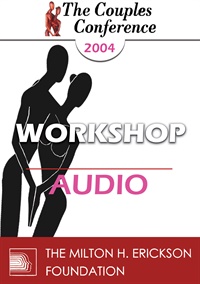
- Average Rating:
- Not yet rated
- Topic Areas:
- Workshops | Attachment | Couples Therapy | Divorce | Marriage | Neuroscience
- Categories:
- Couples Conference | Couples Conference 2004
- Faculty:
- Helen E. Fisher, PhD
- Duration:
- 1:51:10
- Format:
- Audio Only
- Original Program Date:
- Mar 28, 2004
- Short Description:
- This workshop discusses the brain circuitry of the three primary mating emotions: lust, attraction and attachment. It traces the evolution of these emotion systems and illustrates how their neural circuitry contributes to contemporary patterns of marital harmony and discord including adultery; divorce; stalking behavior; clinical depression due to rejection in love; and other issues brought to contemporary couples therapy.
- Price:
- $15.00 - Base Price

- Average Rating:
- Not yet rated
- Topic Areas:
- Divorce | Couples Therapy | Topical Panels | Assessment
- Categories:
- Couples Conference | Couples Conference 2011 | Pioneers in Couples and Family Therapy
- Faculty:
- Lilian Borges, MA, LPC | William Doherty, PhD | Julie Gottman, PhD
- Duration:
- 59:04
- Format:
- Audio Only
- Original Program Date:
- Apr 02, 2011
- Short Description:
- A panel discussion on effectively assessing when separation or divorce may be appropriate for couples. Experts share practical methods, including structured assessment sessions using conflict discussions and physiological responses, as well as discernment counseling to clarify couples’ decisions. They emphasize key factors such as trust, emotional intimacy, conflict management, and therapist neutrality. Real-world examples highlight handling severe issues like addiction and domestic violence, and maintaining hope while supporting clients' difficult decisions.
- Price:
- $15.00 - Base Price
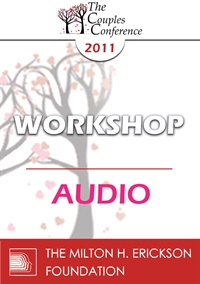
- Average Rating:
- Not yet rated
- Topic Areas:
- Divorce | Workshops | Couples Therapy | Marriage
- Categories:
- Couples Conference | Couples Conference 2011 | Pioneers in Couples and Family Therapy
- Faculty:
- William Doherty, PhD
- Duration:
- 1:55:54
- Format:
- Audio Only
- Original Program Date:
- Apr 03, 2011
- Short Description:
- This workshop will help you examine how your values and life experience affect your treatment of couples on the brink of divorce, and will teach you a protocol for helping clients make a decision that has integrity for all involved and that improves the odds that couples will try to heal their broken bond.
- Price:
- $15.00 - Base Price
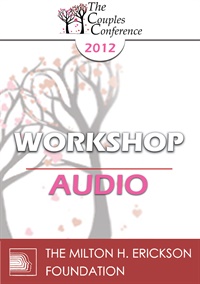
- Average Rating:
- Not yet rated
- Topic Areas:
- Divorce | Workshops | Couples Therapy | Marriage
- Categories:
- Couples Conference | Couples Conference 2012 | Pioneers in Couples and Family Therapy
- Faculty:
- William Doherty, PhD
- Duration:
- 1:59:01
- Format:
- Audio Only
- Original Program Date:
- Apr 27, 2012
- Short Description:
- This workshop will identify the common mistakes in working with mixed-agenda couples (one leaning out and the other leaning in), and will teach you a protocol for “Discernment Counseling” to help clients make a decision that has integrity for all involved and that improves the odds that couples will try therapy to heal their broken bond.
- Price:
- $15.00 - Base Price
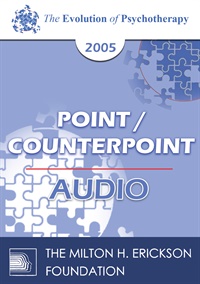
- Average Rating:
- Not yet rated
- Topic Areas:
- Point/Counterpoint Sessions | Divorce | Couples Therapy | Marriage | Psychotherapy
- Categories:
- Evolution of Psychotherapy | Evolution of Psychotherapy 2005
- Faculty:
- John Gottman, PhD | Julie Gottman, PhD | Cloe Madanes, HDL, LIC
- Duration:
- 1 Hour 19 Minutes
- Format:
- Audio Only
- Original Program Date:
- Dec 08, 2005
- Short Description:
- The Gottmans will review research that shows that when the first baby arrives, up to 67% of couples go through a tragic deterioration in the quality of their relationship, which usually begins the cascade toward divorce. Their research outlines the consistent phenomena in this transition, and how the minority of marriages do manage to succeed in avoiding this tragedy. The Gottmans will describe a new approach to the problem and present the results of randomized clinical trial preventative intervention with one-year follow-up data on that intervention.
- Price:
- $15.00 - Base Price
- Average Rating:
- Not yet rated
- Topic Areas:
- Conversation Hours | Brief Therapy | Couples Therapy | Divorce | Relationships | Therapist Development
- Categories:
- Evolution of Psychotherapy | Evolution of Psychotherapy 2021 | Pioneers in Couples and Family Therapy
- Faculty:
- Michele Weiner-Davis, LCSW
- Course Levels:
- Master Degree or Higher in Health-Related Field
- Duration:
- 1 hour
- Format:
- Audio and Video
- Original Program Date:
- Dec 05, 2021
- Short Description:
- Michele Weiner-Davis shares what she’s learning from her latest work with couples facing infidelity and disconnection. She outlines a three-stage model for healing affairs, explores why desire discrepancies can quietly erode connection, and reflects on the shift toward longer, more immersive sessions. Grounded, hopeful, and highly practical, the session invites fresh thinking for therapists supporting couples on the brink.
- Price:
- $59.00 - Base Price
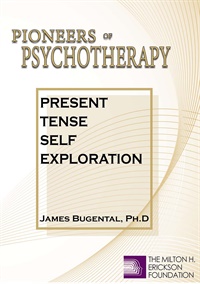
- Average Rating:
- Not yet rated
- Topic Areas:
- Clinical Demonstrations | Psychotherapy | Divorce | Marriage
- Bundle(s):
- Pioneers of Psychotherapy Bundle
- Categories:
- Pioneers of Psychotherapy | Evolution of Psychotherapy | Evolution of Psychotherapy 2000
- Faculty:
- James Bugental, PhD
- Course Levels:
- Master Degree or Higher in Health-Related Field
- Duration:
- 01:38:00
- Format:
- Audio and Video
- Original Program Date:
- May 27, 2000
- Short Description:
- James Bugental (2000) explains the importance of focusing on immediate subjective experiences. Bugental works with Glenda who is experiencing deep guilt about an upcoming divorce. Bugental addresses questions from the audience. A second volunteer explores issues surrounding her recent career change. Bugental explains his approach and answers questions.
- Price:
- $59.00 - Base Price


